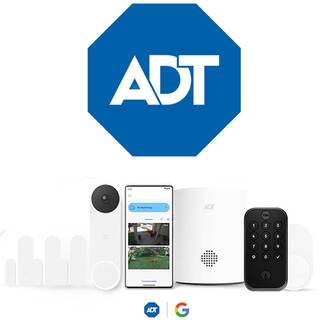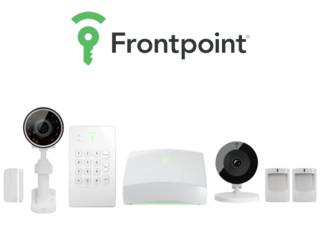Best DIY Home Security Systems of 2024
The best home security systems offer a great way to protect your home from potential outside threats. However, the cost and commitment of professionally installed home security systems with a contractual obligation can put off some people from the process. DIY home security systems provide low-cost solutions with a high degree of customization. Read on for our top picks of the best DIY home security systems.
Our top picks for the best DIY home security systems
- Best smart home integration: Abode
- Best for customizability: ADT
- Best for budget: Frontpoint
- Best for Alexa users: Ring
- Best package options: Simplisafe
Companies listed below are sorted by alphabetical order.
Best DIY home security systems reviews
Abode offers a wide variety of smart home solutions, including smart home devices powered by Google Nest and Apple HomeKit, among others. It also integrates with voice assistant programs such as Google Assistant, Z-Wave and Amazon Alexa. This makes Abode the best choice for people looking for smart-enabled security systems.
Abode systems come in DIY home security kits starting at $259. Plans include self monitoring options under the standard plan or professional monitoring with the Pro Plan, with the latter costing $24.99 a month. You can also choose the annual plan for $229.99, reducing the monthly cost to under $20 a month.
- Smart home integration with every popular system
- Easy self-installation
- No video doorbell or keypad options
- Equipment cost:
- $259
- Monthly fee:
- $24.99 ($229.99 if billed annually)
- Remote access:
- Yes
- Power outage back-up:
- Yes
- Voice assistant compatibility:
- Yes
ADT allows you to customize your system with a straightforward setup and ample gadgets from which to choose. ADT’s DIY system also syncs up your Google Nest products through its ADT+ mobile app, allowing you to control your smart home security setup and receive safety notifications from virtually anywhere.
ADT’s DIY options include a suggested Starter Kit and Premium package, as well as the option to shop for each add-on individually. The Build Your Own option goes for $194.98, the Starter Kit for $389.96 and the Premium option for $744.92. All three options come with professional monitoring, with a $24.99 a month essential monitoring option for the Build Your Own kit and a $34.99 a month option to add video monitoring.
- Cancel professional monitoring anytime
- Integrated with Google Nest
- No free self-monitoring option
- Equipment cost:
- $194.98
- Monthly fee:
- $24.99
- Remote access:
- Yes
- Power outage back-up:
- Yes
- Voice assistant compatibility:
- Yes
Frontpoint’s DIY home security systems don’t require a professional installation and offer a high degree of customizability. The company allows you to purchase a barebones hub-and-sensor pack and add to it the equipment you see fit. Its ease of installation, combined with its low point of entry, makes this the best choice for homeowners on a budget.
Frontpoint’s starter home security system costs $79, by far the lowest entry point on DIY security systems on the market. The company also offers more involved systems such as its Premier system ($169) and its Ultimate system ($419). You can also build your own system from scratch to mix and match to your liking.
- Cheapest system option
- Mix and match products to fit your needs
- Expensive professional monitoring option
- Equipment cost:
- $79
- Monthly fee:
- $49.99
- Remote access:
- Yes
- Power outage back-up:
- Yes
- Voice assistant compatibility:
- Yes
Ring, known for their Amazon Alexa-enabled video doorbells, offers alarm security kits that include door and window contact sensors, motion detection and alarm range extenders. Ring also offers a Protect Pro subscription with no-contract, 24/7 alarm professional monitoring for one location. Ring’s alarm systems come in two varieties: its 2nd-generation Alarm Security Kit and its Ring Alarm Pro, which comes with a built-in eero Wi-Fi 6 Router.
Ring’s alarm systems start at $199.99 for its 5-piece Alarm Security Kit and $299.99 for its 8-piece Ring Alarm Pro variety. Both systems have upgrade options to add more equipment. Ring Protect Pro’s no-contract subscription starts at $20 a month when billed monthly or $200 a year, per location.
- Easy DIY installation
- Monitoring service includes video saving and cloud storage
- Not compatible with Google Nest
- Equipment cost:
- $199 (Ring Alarm Security), $299 (Ring Alarm Pro)
- Monthly fee:
- $20 a month, $200 if billed annually
- Remote access:
- Yes
- Power outage back-up:
- Yes
- Voice assistant compatibility:
- Yes
SimpliSafe is a no-contract DIY home security system with easy, no-tools-required installation. All systems come with 24/7 alarm monitoring in the form of Simplisafe’s Fast Protect professional monitoring services. The company’s system bundles focus on different types of security risks, including “The Haven” for water leaks, “The Knox” for larger homes and “The Foundation” for smaller homes and apartments (which primarily protects your front door).
SimpliSafe’s bundles for traditional homes start at $167.97 (Essentials package) and go all the way up to $425.94 for its all-in-one system The Beacon. You can also opt to pay monthly over a 24-month payment plan instead of paying everything upfront. The company’s Fast Protect professional monitoring services cost $29.99 a month.
- 60-day money back guarantee
- First month of professional monitoring is free
- No smart home automation with basic package
- Equipment cost:
- $167.97
- Monthly fee:
- $29.99
- Remote access:
- Yes
- Power outage back-up:
- Yes
- Voice assistant compatibility:
- Yes
DIY Home Security System Guide
As the name suggests, a DIY home security system allows you to protect your home without the burden of a full-time contract to a home security company. Having a DIY home security system also allows you to customize your setup to the finest detail, adding and removing features to fit your home’s needs and your budget.
How does a DIY home security system work?
There are two types of DIY home security systems. You may decide on a self-installed home security system that you can monitor on your own time through app-assisted live video on your phone or a smart home security system with monitors in your home.
You can also opt to hire professional monitoring services for your DIY home security camera setup. These professional monitoring plans usually involve a monthly fee but without the added commitment of a contract. These plans are better for homeowners who want a hassle-free setup without having to worry about video storage or constant monitoring.
How to build a “do it yourself” home security system
To build a do-it-yourself home security system, you first need to decide what sort of security equipment you are interested in integrating into your home. Home security systems can be varied, but they can include:
- An alarm system controlled by base station control panel (which can have a keypad or a touchscreen)
- Key fob
- A video doorbell
- Motion detectors, contact sensors and motion sensors
- Window sensors, including glass break sensors
- Entry sensors, including door sensors
- Outdoor camera system
- Indoor camera system for sensitive areas
- Smart locks
- Integrated smoke detectors
- Integrated thermostats
- A battery backup system and a cellular backup system
You can choose to install these yourself or hire professional installation services. In any case, make sure your monitored system is properly installed and your outdoor security cameras cover the main entrance ways of your home. The best security cameras and sensors are wirelessly connected to your phone so you can be alerted if something happens while you’re away.
After installing your home security system, it’s time to decide if you want smart home integration. Most home security system technology comes Wi-Fi enabled through your router, with the option to be integrated to smart home solutions such as Apple Homekit, Amazon Alexa and Google Home automation.
Integration with these systems allow for cloud storage of your home security camera footage across all your devices.
Finally, it’s time to decide if you want professional monitoring or self-monitoring. This comes down to how involved you want to be in the process and if you don’t mind incurring a monthly fee for professional monitoring.
How much does a DIY home security system cost?
On average, a home security system can cost around $200 to $600. This includes the equipment and professional installation. Monthly monitoring fees can cost anywhere from $20 to $60 a month.
Do DIY home security systems require a monthly fee?
DIY security systems require a monthly fee if you hire professional monitoring. These companies will contact you and the authorities if a system breach or home break-in occurs.
- Lower costs than a contracted home security system
- High degree of customization with your security setup
- Smart home integration makes it easy to keep track
- A home security system can lower your homeowner’s insurance premiums
- Warranty is limited and repairs can be costly
- Proper installation is key to avoid errors
- Professional monitoring services can incur monthly costs
- Add-ons after the fact can be expensive
How to choose the right DIY home security system
When deciding which DIY home security system to pick, there are multiple factors to consider. One is cost, which is directly related to how much equipment you need. For a simple setup, cost may not be an issue, while outside cameras around your whole home with 24/7 monitoring will have you incurring in higher upfront and ongoing costs.
Smart home compatibility is also a factor to consider, especially if your devices are already tied to a particular framework such as Google Nest, Amazon Alexa or Apple HomeKit. Consider a system that fits your budget, needs and goes with the smart home solution of your choosing.
Best DIY home security systems FAQs
Are DIY home security systems renter-friendly?
What is the best “do it yourself” home security system without a monthly fee?
Does a home security system increase your property value?
How we chose the best DIY home security systems
The factors that weighed on our reviews for best DIY home security systems included the overall cost of the system (both upfront and ongoing), the system’s smart home integration options and the overall level of customization available to each system. Special attention was also given to how expensive its professional monitoring option was in comparison to its self monitoring option.







